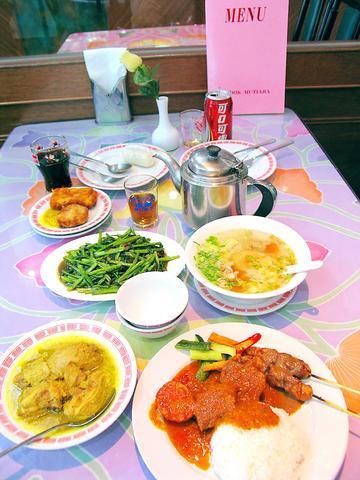One of the irritations of eating international cuisine in Taipei is that it generally has the same underlying flavor as local foods. The oil used in the preparation of the dish doesn't seem to vary, the ingredients are all local and the cooks, though capable, create a meal that is labeled differently but may as well have come from the same kitchen.
It was therefore something of an "ah-ha experience" when I sampled the nasi goreng at Pondok Mutiara Restaurant. Not unlike Proust and his madeleine, I was transported back in time and a couple of thousand of kilometers away to Indonesia, where I first enjoyed the dish. It had an authentic taste. It may have been just refried rice, onion, garlic, chili and soy sauce, with the addition of shrimp paste, a lightly fried egg, some cucumber slices and prawn crackers on top -- but it didn't taste like Chinese food.
It obviously helps that Diana Lu Chang (張盧鵬英) was originally from Indonesia (albeit 45 years ago) and still has ties with the country. She started her family-run restaurant 27 years ago and it has been at its present address on Fuxing North Road for over 10 years. Chang has become something of a celebrity and is often invited to demonstrate her culinary skills on Formosa TV.

PHOTO: JULES QUARTLY, TAIPEI TIMES
We sampled one of the set meals and added some dishes, which gave us a range of flavors: from the coconut curried chicken; to the Holland spring rolls of chicken, butter and mustard, wrapped in a thin wheat flour pastry; to the uniquely Indonesian shrimp paste-flavored vegetables; and the condensed milk, ice and sweets confection that came at the end. Chang recommended the curry fish heads, for the brave, and rendang sapi, a spicy beef dish in coconut and chili sauce.
We were full but a meal would not be complete, she said, without sampling the homemade thousand-layer cake and some Javanese coffee. She was right. The coffee was strong, dark and full of character. The cake was delicious, light, honeyed and satisfying. We were told that there were, in fact, only 18 layers. Further research found that it is quite an art to contrive a genuine thousand-layer cake (it is made of flour, yeast, sugar, lard and red dates, steamed, rolled and folded) and that it was originally a Chinese recipe. Boxes of the cake are sold on the premises as the "authentic taste of the Dutch royal family."
Some restaurant critics would take issue with the decor. They might say the place had an antiquated feel, that the lighting and general appearance were uncoordinated. Such comments put style before substance and are incidental to the food and the enjoyment of "authentic" cuisine.
Selamat Makan (enjoy your meal).

April 14 to April 20 In March 1947, Sising Katadrepan urged the government to drop the “high mountain people” (高山族) designation for Indigenous Taiwanese and refer to them as “Taiwan people” (台灣族). He considered the term derogatory, arguing that it made them sound like animals. The Taiwan Provincial Government agreed to stop using the term, stating that Indigenous Taiwanese suffered all sorts of discrimination and oppression under the Japanese and were forced to live in the mountains as outsiders to society. Now, under the new regime, they would be seen as equals, thus they should be henceforth

Last week, the the National Immigration Agency (NIA) told the legislature that more than 10,000 naturalized Taiwanese citizens from the People’s Republic of China (PRC) risked having their citizenship revoked if they failed to provide proof that they had renounced their Chinese household registration within the next three months. Renunciation is required under the Act Governing Relations Between the People of the Taiwan Area and the Mainland Area (臺灣地區與大陸地區人民關係條例), as amended in 2004, though it was only a legal requirement after 2000. Prior to that, it had been only an administrative requirement since the Nationality Act (國籍法) was established in

Three big changes have transformed the landscape of Taiwan’s local patronage factions: Increasing Democratic Progressive Party (DPP) involvement, rising new factions and the Chinese Nationalist Party’s (KMT) significantly weakened control. GREEN FACTIONS It is said that “south of the Zhuoshui River (濁水溪), there is no blue-green divide,” meaning that from Yunlin County south there is no difference between KMT and DPP politicians. This is not always true, but there is more than a grain of truth to it. Traditionally, DPP factions are viewed as national entities, with their primary function to secure plum positions in the party and government. This is not unusual

US President Donald Trump’s bid to take back control of the Panama Canal has put his counterpart Jose Raul Mulino in a difficult position and revived fears in the Central American country that US military bases will return. After Trump vowed to reclaim the interoceanic waterway from Chinese influence, US Defense Secretary Pete Hegseth signed an agreement with the Mulino administration last week for the US to deploy troops in areas adjacent to the canal. For more than two decades, after handing over control of the strategically vital waterway to Panama in 1999 and dismantling the bases that protected it, Washington has